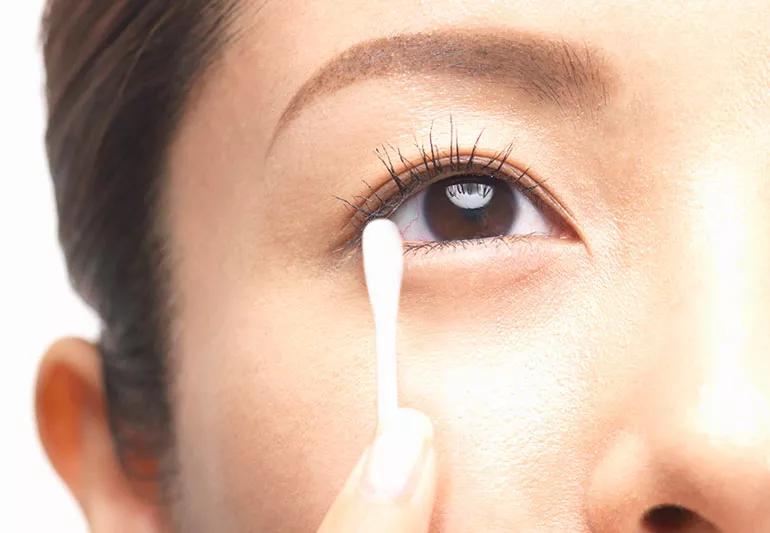Mucus fishing is the latest trend on TikTok and Instagram. But here’s why you shouldn’t do it

There’s yet another viral trend happening on TikTok and Instagram, one that’s as equally hard to look away from as it is to watch. In the videos, users fish in their eyes for mucus by digging it out with their fingers or cotton swabs, only to discover that the mucus returns in exorbitant amounts. This cyclical behavior, which is often a valid health concern for many who are experiencing eye irritation, is known as mucus fishing syndrome. Ophthalmologist Rony Sayegh, MD, explains why it’s best to avoid this behavior altogether.
Advertisement
Cleveland Clinic is a non-profit academic medical center. Advertising on our site helps support our mission. We do not endorse non-Cleveland Clinic products or services. Policy
Your eyes have a protective film on their surface made of tears and mucus — without it, your eyes can become very dry and cracked like chapped lips. This lubrication also allows your eyelids to slide smoothly over your eyes without damaging them.
“The mucus also contains a number of substances that protect the eye from infections with bacteria, fungi and viruses,” says Dr. Sayegh.
When you fish or pull the mucus out of your eye, your eye will become irritated and naturally produce more mucus to help protect its surface and make up for the removal. If you keep removing the mucus from your eye, this process is called “mucus fishing syndrome” because you find yourself continually fishing that mucus out of your eye just to create more of it in the end.
This syndrome often starts because of other untreated conditions.
This condition occurs when your tears are not adequate enough to keep your eyes lubricated, causing your eyes to appear red, burn or itch. Dry eyes can sometimes be associated with inflamed eyelids (blepharitis). In response, your eyes will flood with emergency tears and excess mucus. “This is the most common condition associated with mucus fishing syndrome,” says Dr. Sayegh. “Since dry eye is a chronic condition that can manifest with scratchy, itchy eyes and increased mucus production, it can start the whole cycle of mucus fishing,” he notes.
Advertisement
One of the most common eye infections in children and adults, pink eye occurs when the inner lining of your eyelid and the outer coating of your eye becomes inflamed as a result of a virus. Bacterial infections and allergic reactions can also cause similar symptoms. Besides those tell-tale red eyes, you’ll notice itching and increased mucus production.
A number of disorders related to hair pulling, skin picking and nail biting may also lead to mucus fishing, and these habits can be challenging to manage. “Some patients — especially with trichotillomania (hair-pulling disorder) — have a tendency to pull their lashes out,” says Dr. Sayegh. “That can traumatize the surface of the eye and start the cycle of increased mucus production as the eye tries to heal itself.”
If you keep reaching for your eyes, removing strings of mucus from them and have trouble controlling this behavior, you likely have mucus fishing syndrome and should see a doctor. They may find signs of damage from self-inflicted trauma when looking at the surface of your eye; however, mucus fishing syndrome is often overlooked due to the various conditions that cause it. It’s important that if you believe you have this syndrome, you mention it directly to your doctor. “Unfortunately, some patients may not admit to touching their eyes frequently or even deny it, which may make the diagnosis more challenging,” says Dr. Sayegh.
Although the long-term consequences of mucus fishing are still unclear, left unchecked, it can cause infection and serious injuries to your eyes.
“The repeated trauma with fingers that have not been washed could potentially lead to eye infections,” says Dr. Sayegh. “Scarring of the surface of the eye or inner side of the eyelid can also occur.”
“An important step in treating mucus fishing syndrome is to control the underlying condition that is leading to the increased mucus production,” says Dr. Sayegh. If you’re experiencing constant eye irritation or your eyes feel inflamed, you should contact your doctor. They might recommend using artificial tears or anti-allergy eye drops to treat a variety of conditions that bring on mucus fishing syndrome.
There are also electronic wristbands and smartwatch apps that vibrate when you attempt to touch your face. Although these have not been tested for the purpose of mucus fishing, they can help remind you to avoid reaching for your eyes to better help control your behavior.
“Avoiding touching your eyes is essential in breaking the cycle of the disease,” says Dr. Sayegh.
Advertisement
Learn more about our editorial process.
Advertisement

Early morning red eyes can be a sign of several conditions, like dry eyes, allergies and eye strain

See an eye specialist if your pain isn’t going away and comes with other symptoms

Your eyes could be burning because of allergies, elevated salt levels, dry eyes and more

One is a raised yellow spot on your eye, the other is a fleshy growth

When worn incorrectly, contacts can cause or worsen dry eye symptoms

Preservative-free lubricating drops, a humidifier, sunglasses and preventive medications can help with dry eyes, no matter the season

In moderation, vitamins A, C, D, E, B12 and omega-3 fatty acids can improve and maintain your eye health

Pink eye usually refers to infectious conjunctivitis, which can look similar to allergies or other infections and eye conditions

Wearing a scarf, adjusting your outdoor activities and following your asthma treatment plan can help limit breathing problems

Your diet in the weeks, days and hours ahead of your race can power you to the finish line

When someone guilt trips you, they’re using emotionally manipulative behavior to try to get you to act a certain way